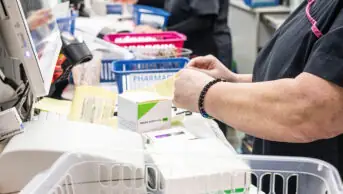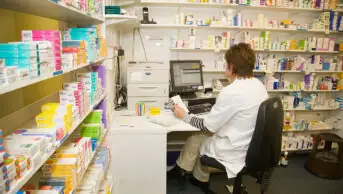
JL / Shutterstock.com
So far, 2019 has been a tumultuous year in the world of pharmacy education. Cuts loom over NHS preregistration training, the General Pharmaceutical Council has ruffled feathers with a proposal that could lead to a five-year pharmacy degree and then news broke of a push for an apprenticeship scheme from big pharmacy employers, such as Boots and Well Pharmacy.
The announcement on 4 April 2019 took many – including some pharmacy organisations – by surprise, with some branding it “highly disruptive” to the profession. However, others have cautiously welcomed a new route that could open the profession up to a broader range of talent.
The move is part of a £95m government drive to widen skills-based training in England, with new “degree apprenticeships” introduced in 2015 and large companies forced to pay a compulsory apprenticeship levy from 2018.
The word ‘apprenticeship’ may evoke images of heavy industry and blue boiler suits, but schemes have been introduced as an alternative route into other healthcare professions, including nursing, and proponents argue that it could help ensure the future supply of pharmacists (see Box 1).
Radical proposals
Since March 2018, pharmacists have been able to become apprentices in England to gain a Master’s qualification in advanced clinical practice, and an apprenticeship scheme for the training of pharmacy technicians is currently in development (see Box 2).
But this is the first time that proposals have been published to introduce a five-year Master’s degree level apprenticeship scheme that would replace the current four-year MPharm and the preregistration year in England. There are no plans for similar proposals in Scotland and Wales.
On 4 April 2019, the Institute for Apprenticeships and Technical Education (IATE) opened a ten-day consultation on a proposal from the Pharmacy Apprenticeship Trailblazer Group — an organisation that represents various employers across the pharmacy sector — for a 60-month pharmacy degree apprenticeship.
The detail in the consultation was sketchy. As per IATE standard procedure, the proposal included only an occupation profile: a summary of the purpose of the pharmacists’ role, and their skills and duties.
It says that ‘typically’ a pharmacist’s role would include ensuring patient safety by advising patients about medicines, supervising the medicines supply chain and providing services that enable patients to be fully involved in their own care.
A more detailed “occupational standard”, the second stage of the process, will be published at some point after the consultation responses have been considered, and the consultation document says the target date for final approval of the proposals is 31 December 2019.
The exploration of new, innovative ways of developing our workforce is vital in ensuring we have a skilled workforce that is fit for the future
The IATE refused to release the names of the employers included in the trailblazer group until the occupational standard is published , but The Pharmaceutical Journal understands it includes Boots and Well Pharmacy, as well as some other large community pharmacy employers and NHS trusts.
Jessica Hall, learning and development manager (clinical and professional) at Well Pharmacy, explains that it has worked with employers from “other sectors” as well as community pharmacy to develop the proposals.
She says: “The exploration of new, innovative ways of developing our workforce is vital in ensuring we have a skilled workforce that is fit for the future”.
Unexpected turn
Some pharmacy organisations expressed surprise at the proposals.
Gail Fleming, director for education and professional development at the Royal Pharmaceutical Society (RPS), says the Society was not consulted on the proposals and is yet to form an opinion on their worth: “Our request is for more information so that we, and our members, can come to an informed view.”
Fleming previously wrote to the IATE expressing concern at the lack of information that had been made available and calling for greater transparency so that RPS members could understand the ongoing deliberations.
It would shift the profession away from a professional university-led model to a model traditionally associated with technical occupations
Others have been more strident. The Pharmacists’ Defence Association (PDA) said the proposals would lead “to a two-tier approach” to qualifying as a pharmacist.
In its response to the consultation, published on 11 April 2019, the PDA said: “An apprenticeship route for qualification as a pharmacist would be highly disruptive to the pharmacy profession. It would shift the profession away from a professional university-led model to a model traditionally associated with technical occupations.”
Given the cloak of secrecy around the development of the proposals, it is unclear what motivations there are behind their introduction. However, large employers may be looking for a return on their payments to the Treasury under the apprenticeship levy – set at 0.5% of their annual “pay bill” – and may be looking to access government funds of up to £27,000 per apprentice through the National Apprenticeship Service.
This money can only be used to pay for training and assessment, and not wages, but apprentices would be considered employees – rather than students – during the programme.
Smaller employers may also be attracted by the scheme, as the government has recently announced that employers will pay just 5% of apprenticeship training costs from 1 April 2019, with the government making up the difference.
Kate Livesey, policy and programmes manager at the Company Chemists’ Association, the trade association for large pharmacy operators in England, Scotland and Wales, which has some members in the trailblazer group, says the idea is “worth some thought”.
“Given concerns raised around the future supply of pharmacists meeting required demands, we think that it is right to explore all opportunities for attracting more undergraduates into the profession, and to not dismiss out-of-hand any possibilities until they have been thoroughly considered,” she says.
Low student numbers
In 2016/2017, there were the lowest number of applications to study for an MPharm in seven years, and pharmacy school heads have admitted that student recruitment is becoming tougher.
However, Graeme Richardson, president of the Guild of Healthcare Pharmacists (GHP), which represents employed pharmacists, says the current MPharm system already “delivers the appropriate level of science, skills and behaviours to underpin the wide variety of roles of pharmacists”.
We cannot support a model utilising apprenticeship for the education, training, knowledge, expertise, roles and responsibilities for the profession of a pharmacist
He adds that the GHP “supports the need for learning in context and during participation with multiprofessional colleagues to support the level of practice currently offered by pharmacists in all areas of practice”. On that basis, “the GHP cannot support a model utilising apprenticeship for the education, training, knowledge, expertise, roles and responsibilities for the profession of a pharmacist”, says Richardson.
Degree apprenticeship programmes can be designed in an “integrated” way, with employers, universities and professional bodies involved in agreeing standards for academic learning and on-the-job training. But “non-integrated” versions are more common if a degree for the occupation involved already exists – which is the case in pharmacy.
Perhaps understandably, pharmacy schools are wary of what could be perceived as a land grab on their gatekeeper position as the only way into the pharmacy profession. Nigel Ratcliffe, chair of the Pharmacy Schools Council, says that while the profession should look at “creative and innovative ways of educating”, it is important to look first at “what we’re solving for”.
He says: “What are the placements? How do we meet European legislation? How do we meet GPhC standards? How does the university work with and accommodate the needs of the employer that is sponsoring this?”
Ratcliffe adds: “If we were to move forward with an apprenticeship, we need to make sure that we can also have [a] conventional MPharm as well and that they both achieve the same standard.”
‘Dumbing down’ training
The idea that the proposals could ‘dumb down’ pharmacy training is a concern that others share, but a spokesperson from the GPhC told The Pharmaceutical Journal that any pharmacist degree apprenticeship must include an MPharm degree and “all apprenticeship trainees would have to pass our registration assessment before registering as a pharmacist”.
The IATE says that any pharmacy apprenticeship will be held to the same standards: “It will be an MPharm which will be required to comply with the same regulatory requirements set out by the GPhC, including the requirement that higher education institutions must meet their education and training standards.”
Pharmacy students seem more open to change. Rhys Llewellyn, area coordinator and soon-to-be press officer for the British Pharmaceutical Students’ Association, says he attended a meeting on 2 May 2019 between the IATE and other interested parties.
Llewellyn and other attendees heard that “in principle the apprenticeship would be five years, with at least 20% of that time in off-site training – we can have our traditional degree, and this apprenticeship would be an alternate route to that same endpoint”.
Speaking in a personal capacity, Llewellyn says he appreciates that the introduction of apprenticeships could have advantages: “Any step that works towards ensuring the fullest participation and breaking down any barriers, is more than welcome.
“As a profession we should celebrate the diversity that we have and work towards consolidating and progressing that. If this were a means of doing that — and again, we don’t know right now but should it become transparent — then that would be a positive factor.”
Funding obstacle
It is likely that funding will be the major stumbling block. Universities receive an income of around £36,000 over the four years of the current MPharm, but government funding for a five-year degree apprentice ranges from £1,500 to £27,000. Employers could also lose access to Health Education England funding for the current year-long preregistration programme.
It will be essential that any university course is viable and sustainable and provides to the university the same contribution as a traditional MPharm
Ratcliffe says: “MPharm degrees are very expensive to deliver and a university is like any provider of any service: it is a business. It will be essential that any university course is viable and sustainable and provides to the university the same contribution [as a traditional MPharm]”, he says.
Richardson is also concerned about affordability for NHS trusts, which are already facing proposed cuts to their preregistration budgets: “The GHP believes that while there is minimal financial information at present, the cost of delivery based on the above is potentially large for hospital employers.”
The IATE told The Pharmaceutical Journal that the next steps for the proposals are for the trailblazer group to produce a ‘draft occupation standard’ on which it will consult with the pharmacy profession before submitting it to the IATE. This will set out in detail the knowledge, skills and behaviour that a pharmacist is expected to display, as well as the degree apprenticeship entry requirements and assessment methods. The standard must also show how completion of the degree apprenticeship would allow for registration with the GPhC. There will then be a further consultation by the IATE following submission, which will be open for ten days.
If the occupational standard is approved, plans for the endpoint assessment and funding will be set out. Then a funding band would be approved by the government, full details of the degree apprenticeship would be published and it would be approved for delivery.
It is only as this process develops that the constituent parts of the pharmacy profession will be able to determine what apprenticeships might mean for the sector as a whole.
As Rhys Llewellyn says: “For now, we can’t really come to any position — we’re at the start of learning exactly what the process is, how it could look and where it could be for the benefit of students.”
Box 1: What is a ‘degree apprenticeship’?
Degree apprenticeships are a new type of programme that enable students to achieve a full Bachelor’s or Master’s degree while working for an employer.
Apprentices spend part of their time at university and the rest of the time with their employer. This can be on a day-to-day basis or in blocks of time, depending on the programme and requirements of the employer.
They can take between three to six years to complete, depending on the course level. Currently, the scheme is only available in England and Wales, although applications may be made from across the UK.
There are 30 funding bands for apprenticeships, ranging from £1,500 to £27,000. The Institute for Apprenticeships and Technical Education makes a recommendation on which funding band covers an apprenticeship, depending on the length of training and the proportion of training time spent in workplace training. Any costs that occur above this band will need to be met by the employer.
All programmes need an endpoint assessment. In non-integrated degree apprenticeships, this takes place independently after the degree has been completed, as is the case with the current General Pharmaceutical Council preregistration assessment. In an integrated degree apprenticeship, the endpoint assessment is embedded as part of the degree.
Box 2: Healthcare apprenticeships
Many healthcare professions already provide a route to qualification via apprenticeships.
Physiotherapists, nurses and midwives are among the roles that have degree apprenticeships in place. Others that offer apprenticeships at a non-degree level include dental nursing, ambulance practitioner, emergency care assistant, and health informatics.
The first nursing degree apprenticeships were available from September 2017, and most take four years. Physiotherapy and midwife degree apprenticeships will begin in the 2019/2020 academic year.
Pharmacy technicians have always been trained as apprentices, although an apprenticeship standard through the Institute for Apprenticeships and Technical Education is still in development. Employers on the pharmacy technician trailblazer include hospital trusts, clinical commissioning groups, and multiple pharmacy companies such as Boots and Superdrug.
The technician proposals were developed to meet with General Pharmaceutical Council education and training standards for pharmacy technicians, which were published in October 2017.
Reaction on Twitter
Possible drivers here: 1) Apprentice Levy funding would be new money, 2) HEE may wish to see shorter cheaper courses post-Brexit when less constrained by EU directive on pharmacy education, 3) apprenticeships would give employers a better say over who they employ than with Oriel.
— Philip Rogers (@Philip_Rogers) 14 April 2019
My concerns over the apprenticeship proposals are that they’re in response to a pharmacist shortage or a ‘skills gap’. A year is a long time to overcome any skills gap if the pre-reg isn’t used as a cheap member of staff & advertised rates suggest a surplus of pharmacists exists
— Allisons Chemist (@AllisonsChemist) 13 April 2019
But in the #pharmacy profession it’s controversial, so I wanted to point out that #apprenticeships give access to professions for people from disadvantaged backgrounds.
— David Reissner (@davidreissner) 1 May 2019
My opinion on the “Pharmacist Apprenticeship” is simple. I don’t know enough about the scheme to have an opinion and I’m not going to make myself look silly in public by being angry at things that don’t exist. This young man puts it well, take his advice.https://t.co/A2U6RIxkWi
— Khalid Khan (@khalidqkhan) 12 April 2019
I’m finding some of the responses to the idea of a pharmacist apprenticeship quite small minded. There seems to be an assumption that apprenticeships cannot be adapted to produce a “clinical pharmacist”, but how can we be sure of that without proper consideration of the options?
— Chloë Waterson (@littlechloe15) 12 April 2019
Why are pharmacists so uniquely upset by idea of apprenticeships, which are being adopted by other HCPs (nursing, AHPs, ACPs) without significant fuss?
Seems a major reason (not only) is a huge distrust of major employers motives
That doesn’t augur well for the future of pharmacy— Mary Evans (@MaryCEvans1) 27 April 2019
Pharmacy apprenticeship was a bit out of the blue, don’t think it’s fully viable to be honest. I do think an extensive apprenticeship as an entry method to degree learning could be an interesting method of widening participation, similar to foundation years. #pharmacy
— Rory Killeen (@RoryJKilleen) 14 April 2019
- Since this article was published, the Institute for Apprenticeships and Technical Education has said that proposals for a pharmacy apprenticeship have been put on hold.


